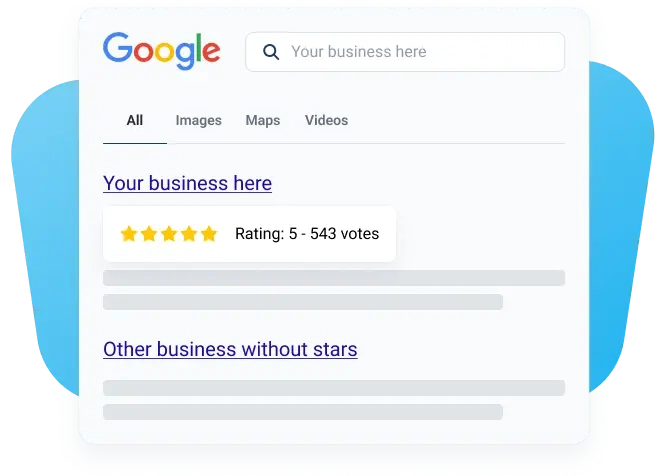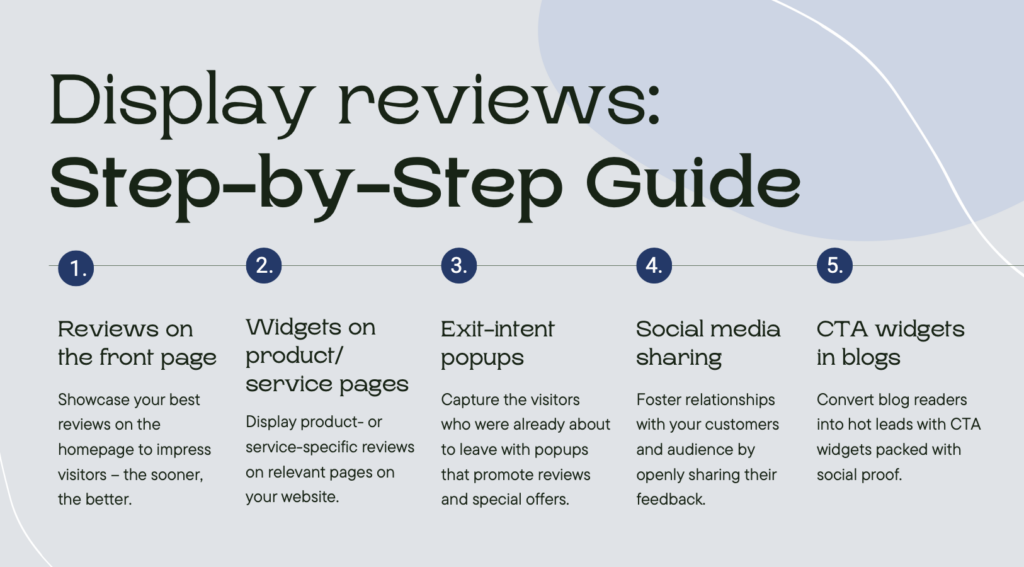SEO Impact of Reviews on 3rd Party Sites


If we learned something about the leak of Google's search algorithm documents back in 2024, it's certainly the fact that reviews play a surprisingly big role in search rankings.
According to these internal documents, reviews can affect SEO efforts in several ways.
Reviews on your website promote clicks, which is a good signal.
Having profiles on review sites grants you quality backlinks that add trust to your domain.
Let's talk about these and more reasons why you should invest in review marketing.
Reviews on Website Drive Clicks -> Good Signals for Google!
The leaked documents reveal that user behavior, particularly clicks, plays a crucial role in Google's ranking system.
Google's NavBoost system, which uses click-driven measures to adjust rankings, highlights the importance of user interactions.
This means that reviews on popular sites like Google My Business, Yelp, and Trustmary's review page not only contribute to visibility but also drive user engagement, which in turn can boost rankings.
But most importantly, having reviews on your own website gives you the benefit of the clicks and increased engaging time directly
How to Implement to Your Website?
Add a review widget to your website.
Good places to add reviews include:
- Home page
- All high-traffic landing pages
- Contact page
- Dedicated testimonial page
- Pricing page

Clicks on review widgets placed on websites can generate ranking signals such as "goodClicks" and "lastLongestClicks," indicating positive user experiences that Google values highly.
Why don't you add all reviews to your website from all sources with an all-in-one review widget?
Diverse and Authoritative Backlinks from Review Sites
Link diversity and relevance are still critical factors in Google's ranking algorithm.
Reviews on different platforms can serve as diverse, authoritative backlinks to your site.
Each review site acts as a unique referring domain, contributing to a holistic and natural link profile that Google favors.
This helps in building what the documents refer to as "siteAuthority," which measures the overall trust and authority of a website.
There are many review sites you can get your business on, but getting reviews to them all can be a more difficult task.
Freshness and Content Updates Keep Google Happy
The freshness of content is another important ranking factor.
Reviews contribute to the continual updating of a business's online presence, signaling to Google that the content is current and relevant.
Google uses features like bylineDate and semanticDate to evaluate the freshness of content.
Regularly receiving and responding to new reviews can help maintain the freshness of your online content, which can positively impact your SEO.
Pro Tip: Getting dynamically updated review widgets is a great way to boost your company's credibility.
User Experience and Satisfaction
User satisfaction metrics, derived from clicks and interactions with review content, are essential.
Google's algorithm considers these metrics to ensure that the search results provide value to users.
High-quality reviews that lead to positive user experiences send strong signals to Google that your business is trustworthy and reliable, which can enhance your rankings.
Negative reviews, if not addressed, can lead to metrics like "badClicks" and potentially harm your SEO. More importantly, not responding to negative reviews can lead to damaged brand reputation.
There was also a Product Review Demotion that is stated to be likely related to the product reviews update or reviews system.
What that means, will remain to be seen.
Brand and Entity Recognition
Building a notable and recognized brand is more important than ever.
The documents highlight that Google values well-recognized brands, and reviews play a pivotal role in establishing brand reputation.
Consistent positive reviews across various platforms contribute to brand authority, which can significantly impact your SEO.
Google stores author and entity information associated with content, and reviews help in creating a credible online entity for your business.

Benefits of Having Reviews on Multiple Review Sites
Having reviews on multiple review sites offers several benefits:
- Enhanced Visibility: Listing your business on various review platforms like Google, Yelp, and TripAdvisor increases your online presence, making it easier for potential customers to find you.
- Improved Trust and Credibility: Diverse reviews from multiple sources enhance your credibility. Prospective customers are more likely to trust a business with positive reviews across different platforms.
- Higher Conversion Rates: Positive reviews act as social proof, encouraging more visitors to convert into customers. This trust can significantly increase your conversion rates.
- Local SEO Boost: Reviews on local sites like Google My Business and Yelp business reviews help improve local SEO, making it easier for local customers to discover your business.
Examples of Review Sites
- Google My Business: Essential for local SEO and overall online presence.
- Yelp: Particularly valuable for local businesses and restaurants.
- TripAdvisor: Ideal for travel, hospitality, and restaurant reviews.
- Trustpilot: Excellent for building trust in various industries, especially in Europe.
- G2 and Capterra: Crucial for SaaS and technology companies.
However, there are alternatives to Trustpilot, and other review sites as well.
Note that there are best practices also for doing SEO on Google My Business. Luckily, they are very down-to-earth and enhance your visibility in AI searches as well.
The key is to be consistent with the information across different directories.
How Adding Reviews to Your Own Website Boosts SEO
Integrating reviews from these sites into your own website can significantly enhance your SEO efforts. Here’s how:
Enhanced User Engagement
When visitors see reviews directly on your website, they are more likely to engage with your content, reducing bounce rates and increasing the time spent on your site. This positive user interaction sends strong signals to Google about the quality and relevance of your site.
Trustmary's clients have seen an increase in time spent on page when adding reviews to their website.
Academy of Brain's sales and marketing director Janne Nieminen reported that people spend more time on a page when they read reviews.
Read more about how to use the voice of customer to boost marketing and sales.
Fresh Content
Reviews provide a continuous stream of fresh content, which Google favors. This regular update can improve your site’s crawl frequency and indexation rate, leading to better rankings.
Improved On-Page SEO
Displaying reviews can improve your on-page SEO by incorporating relevant keywords naturally used by your customers.
This can help in ranking for long-tail keywords and phrases that potential customers might search for.
Trust and Credibility
Featuring authentic reviews builds trust and credibility, encouraging more conversions.
Trust signals like review badges from third-party sites (e.g., Google or Trustpilot) can enhance perceived reliability, which can improve rankings.
How Much Do Reviews Matter for SEO?
As with everything in SEO, the answer is: It depends.
First and foremost it depends on the industry your business is in, and how your competitors are or aren't using reviews.
The Google algorithm leak underscores the multifaceted role of reviews in SEO.
From enhancing link diversity and freshness to improving user experience and brand authority, reviews on different platforms are integral to a robust SEO strategy.
Businesses should leverage reviews not just for customer feedback but as a strategic tool to improve their search rankings and online visibility.
For more detailed insights on how to integrate reviews into your SEO strategy, check out Trustmary's comprehensive guides and solutions for boosting customer satisfaction and trust.
Or book a call to hear how Trustmary Method can help your business:
- Measure customer satisfaction
- Get open feedback
- Collect new reviews
The Easiest Method to Get More Reviews to All Platforms
Create your review marketing strategy to ensure your business is:
- Getting new reviews
- Using reviews to boost organic visibility (= add reviews to website)
Trustmary simplifies the process of collecting reviews by allowing businesses to change the review site they collect reviews for seamlessly. This flexibility ensures you can target the most relevant platforms for your industry or business needs at any given time.
How Trustmary Makes Review Collection Easy
- Integrated Surveys: Trustmary combines customer satisfaction surveys with review collection, making it easy to gather feedback and prompt reviews in one streamlined process.
- Automatic Requests: Automatically send review requests to your customers via email or SMS, ensuring a higher response rate without additional manual effort.
- Multiple Platforms: Easily switch between different review sites such as Google, Yelp, and Facebook to focus on the platforms that matter most to your business at any given time.
- Customizable Survey Templates: Use customizable templates to create personalized and professional review requests, enhancing the likelihood of positive responses.
- Real-time Monitoring: Monitor incoming reviews in real-time and get notified immediately, allowing you to respond quickly and manage your online reputation effectively.